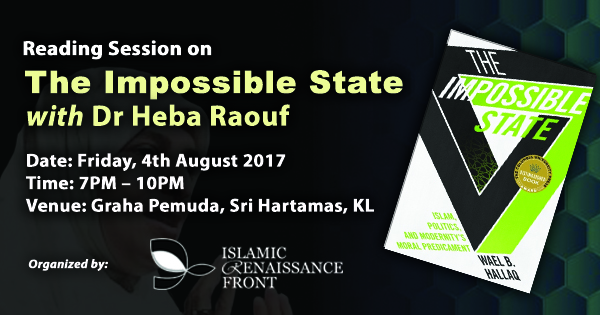Date: Friday, 4th August 2017
Time: 7PM – 10PM
Venue: Graha Pemuda, Sri Hartamas, Kuala Lumpur
Register: https://www.eventbrite.com/e/reading-session-on-the-impossible-state-with-dr-heba-raouf-tickets-36632856861
The Impossible State
Islam, Politics, and Modernity’s Moral Predicament
Wael B. Hallaq
Wael B. Hallaq boldly argues that the “Islamic state,” judged by any standard definition of what the modern state represents, is both impossible and inherently self-contradictory. Comparing the legal, political, moral, and constitutional histories of premodern Islam and Euro-America, he finds the adoption and practice of the modern state to be highly problematic for modern Muslims. He also critiques more expansively modernity’s moral predicament, which renders impossible any project resting solely on ethical foundations.
The modern state not only suffers from serious legal, political, and constitutional issues, Hallaq argues, but also, by its very nature, fashions a subject inconsistent with what it means to be, or to live as, a Muslim. By Islamic standards, the state’s technologies of the self are severely lacking in moral substance, and today’s Islamic state, as Hallaq shows, has done little to advance an acceptable form of genuine Shari’a governance. The Islamists’ constitutional battles in Egypt and Pakistan, the Islamic legal and political failures of the Iranian Revolution, and similar disappointments underscore this fact. Nevertheless, the state remains the favored template of the Islamists and the ulama (Muslim clergymen).
Providing Muslims with a path toward realizing the good life, Hallaq turns to the rich moral resources of Islamic history. Along the way, he proves political and other “crises of Islam” are not unique to the Islamic world nor to the Muslim religion. These crises are integral to the modern condition of both East and West, and by acknowledging these parallels, Muslims can engage more productively with their Western counterparts.
About the Author
Wael B. Hallaq is the Avalon Foundation Professor in the Humanities at Columbia University. Hallaq’s research spans several fields, including law, legal theory, philosophy, political theory, and logic, and his publications include The Impossible State: Islam, Politics, and Modernity’s Moral Predicament, Shari’a: Theory, Practice, Transformations; An Introduction to Islamic Law; and Authority, Continuity, and Change in Islamic Law. His works have been translated into several languages, including Arabic, Indonesian, Hebrew, Japanese, Persian, Turkish, and Russian.
Program
700-800PM: Dinner and Solat
800-810PM: Introduction by the Chairperson, Elma Berisha
810-900PM: Presentation by Dr Heba Raouf
900-1000PM: Discussion
Jointly organized by: Islamic Renaissance Front and Penang Institute


